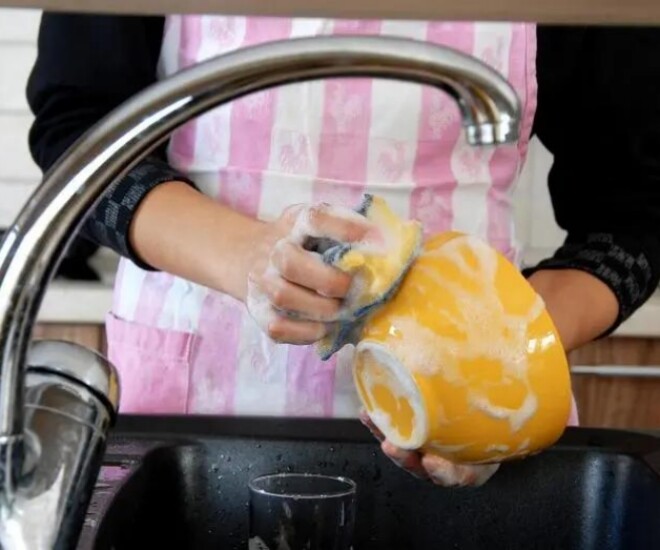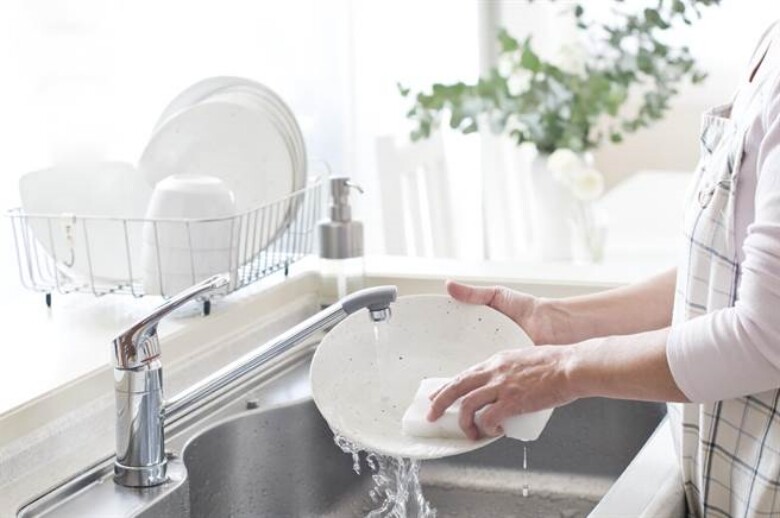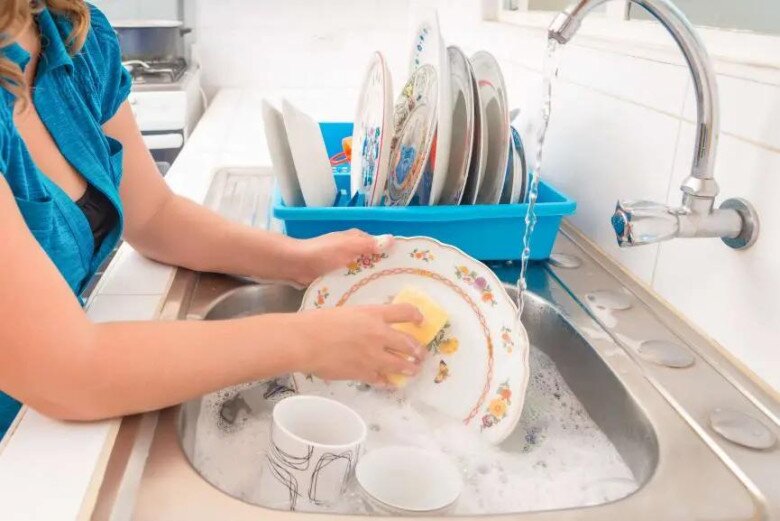
Why You Shouldn’t Wash Dishes Right After Eating
Chemical Reactions Between Food Residues and Detergents
Immediately after a meal, dishes and utensils often have a significant amount of food residue such as oil, grease, meat scraps, vegetables, or sauces. If you use dish soap and start scrubbing right away, these food residues can react with the chemical components in the detergent, creating unwanted compounds.
For example, certain proteins in food may combine with foaming agents or strong chemicals, producing nitrites. Nitrites are harmful to the liver and kidneys and may even pose a cancer risk if they accumulate in the body over time.
These compounds may not be completely rinsed away, leaving residues on the surfaces of the dishes and utensils. When you use them for your next meal, you unknowingly ingest these compounds.

Risk of Damaging Dishes Due to Sudden Temperature Changes
Another often overlooked factor is the temperature difference between the dishes and tap water. Usually, after being in contact with hot food, dishes and utensils retain a considerable amount of heat.
If you immediately rinse them with cold water, a rapid expansion and contraction can occur, which may cause cracks, breaks, or slight deformations, especially with porcelain, glass, or heat-intolerant plastic items.
Over time, these small cracks not only reduce the lifespan of your dishes but also become breeding grounds for bacteria, which are difficult to remove completely even with thorough cleaning.
Washing Dishes Right After Eating Can Strain Your Digestive System
Something that is often overlooked is how physical activity or bending over after a meal, such as washing dishes, can impact digestion. The body needs time after eating for blood to flow to the stomach and aid in digestion.
Engaging in strenuous activity, especially in an uncomfortable posture like bending over to wash dishes, can put stress on the stomach, leading to feelings of fullness, indigestion, and even stomach pain for those with a weak digestive system.
What’s the Solution? A Professional’s Advice
Fortunately, the solution to this problem is not complicated. Here are some practical tips from professional restaurant cleaning staff:
Wait 10-15 Minutes After Eating Before Washing Dishes
This allows the dishes to cool down, preventing thermal shock when exposed to cold water. It also gives food residues time to dry and harden slightly, making them easier to clean and reducing the likelihood of unwanted chemical reactions with detergents.
Use Warm Water
Washing dishes with warm water helps dissolve grease and food residues more effectively, reducing the amount of dish soap needed and speeding up the cleaning process. If you have a dishwasher, set it to use warm water or a sterilization cycle for better results and safety.

Maintain Hygiene for Cleaning Tools
Don’t forget that dishcloths, sponges, and steel wool can also harbor bacteria if not properly cleaned. Wash them daily, dry them thoroughly, and replace them periodically to avoid using them for too long. Dirty cleaning tools can cross-contaminate dishes even after they’ve been washed.
Ensure Dishes Are Completely Dry Before Storing
After washing, it’s crucial to air-dry dishes on a rack. A moist environment is ideal for mold and bacterial growth. If possible, use a drying cabinet or sterilizer to further enhance hygiene and safety.
Washing dishes immediately after eating may seem like a tidy and sensible habit, but it can pose health risks and damage your dishware. By making small changes to your routine, such as waiting a few minutes, using warm water, and paying attention to the hygiene of your cleaning tools, you can better protect your health and that of your family.
Try implementing these tips today, and you’ll notice a significant difference!
The Ancestors’ Warning: “Avoid These 3 Directions for Your Stove and 3 Places for Your Bed”
The ancient practice of Feng Shui emphasizes the importance of the three directions of the stove and the three positions of the bed. These principles are believed to bring harmony and prosperity to the home. So, what are these specific directions and positions, and why are they so crucial to avoid any mishaps?






































